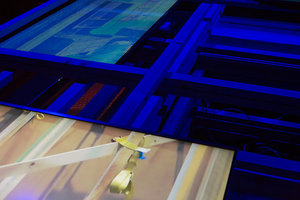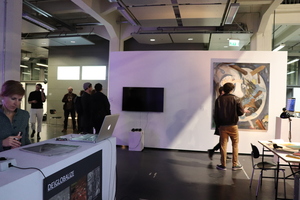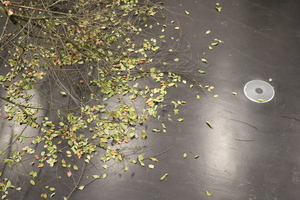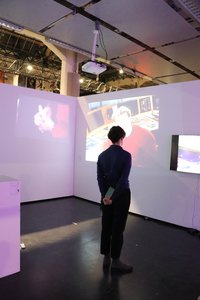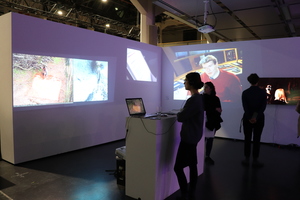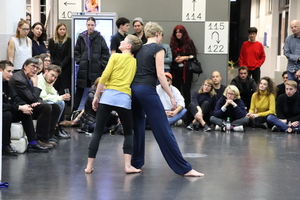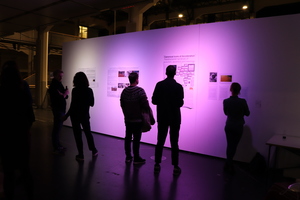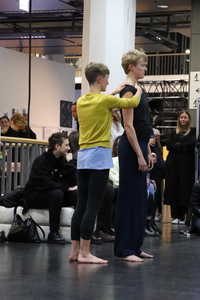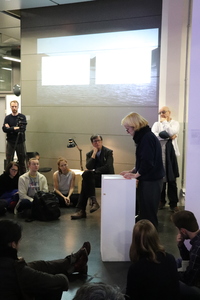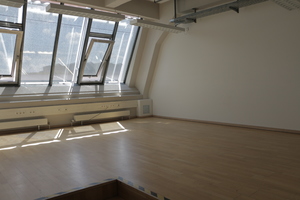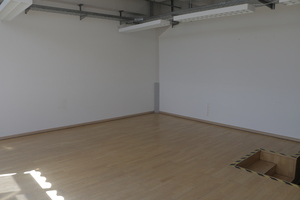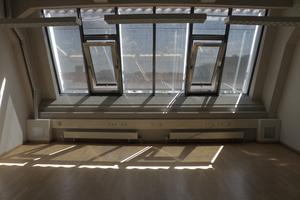"Ausstellung"
| Begriff | Ausstellung |
| Metakey | Typ des Projekts/Werks (creative_work:type) |
| Typ | Keyword |
| Vokabular | Werk |
235 Inhalte
- Seite 1 von 20
Test Drive
- Titel
- Test Drive
- Autor/in
- Beschreibung (de)
- Das Format der Probe wird in Test Drive zur Arbeitsmethode erklärt. Die Funktion der Probe wird als ein nicht definiertes, unproduktives und ergebnisloses Format verstanden, das sich Gedanken von Effizienz und Perfektion entgegensetzt. Das Potential von Zufall, Wiederholung, Unterbrechung, von Scheitern und Neuanfang wird innerhalb dieser Form der Arbeit erschlossen. Im Gegensatz zum klassischen Verständnis der Probe, die der Perfektionierung eines Endprodukts, der Aufführung, dient, widmet sich die Arbeit keinem eindeutigen Ziel und öffnet sich dem Gedanken des Unfertigen. Der Prozess wird zum Ziel einer ziellosen Arbeit. Gleichermaßen werden in Test Drive herkömmliche Strukturen und Hierarchien außer Kraft gesetzt, innerhalb derer szenografische Arbeit heute vorrangig stattfindet. Der ergebnisoffene Charakter der Probe bedarf keiner Textgrundlagen oder dramaturgischer Konzepte und ermöglicht es so, den Raum zum Ausgangspunkt der Arbeit werden zu lassen.
Die Installation Test Drive besteht aus einem 4-Kanal-Video, Sound und einer quadratischen Konstruktion (ca. 3,0 x 3,0 x 1,0 m) aus Holz, Stahlprofilen, Rigipsplatten und Bildschirmen. Die unterschiedlich angeordneten Bestandteile des Displays sind in mehreren Schichten übereinandergelegt und bilden ein Tragwerk
- Das Format der Probe wird in Test Drive zur Arbeitsmethode erklärt. Die Funktion der Probe wird als ein nicht definiertes, unproduktives und ergebnisloses Format verstanden, das sich Gedanken von Effizienz und Perfektion entgegensetzt. Das Potential von Zufall, Wiederholung, Unterbrechung, von Scheitern und Neuanfang wird innerhalb dieser Form der Arbeit erschlossen. Im Gegensatz zum klassischen Verständnis der Probe, die der Perfektionierung eines Endprodukts, der Aufführung, dient, widmet sich die Arbeit keinem eindeutigen Ziel und öffnet sich dem Gedanken des Unfertigen. Der Prozess wird zum Ziel einer ziellosen Arbeit. Gleichermaßen werden in Test Drive herkömmliche Strukturen und Hierarchien außer Kraft gesetzt, innerhalb derer szenografische Arbeit heute vorrangig stattfindet. Der ergebnisoffene Charakter der Probe bedarf keiner Textgrundlagen oder dramaturgischer Konzepte und ermöglicht es so, den Raum zum Ausgangspunkt der Arbeit werden zu lassen.
- Typ des Projekts/Werks
- Mitwirkende
- Material
- Ort: Institution
- Stadt
- Titel
- Test Drive
- Urheberrechtshinweis
- Alper Kazokoglu
- Projektleiter/in
- Semester
- Importiert am
- 26.01.2019
- Übergeordnete Sets
- 0
Critical Zones
- Titel
- Critical Zones
- Titel (en)
- Critical Zones
- Autor/in
- Beschreibung (de)
- “Critical Zones”: Developing concepts and approaches for grasping the New Climatic Regime (Bruno Latour), that is the transformations in the relations of humans to their “terrestrial” conditions of existence. – The seminar series of Bruno Latour at HfG analyses these transformations as epistemic breaks and shifts of knowledge by drawing an analogy to the scientific revolution in the 17th century, where, after a crisis of former sound knowledge, new epistemic systems, representations and narrations in art, science, and religion had to be constructed and reintegrated into new dispositifs of knowledge. The project tackles an important aesthetic question, which overpasses simple forms of illustration of knowledge: How central is the imaginary capacity of the arts in constructing representations and narrations that are depictions and “generators” of new knowledge systems and therefore vital means of cultural change?
The exhibition at HfG in November will display some preliminary results of the projects developed by the seminar participants. It presents an opportunity to discuss – in a mode of work-in-progress – research questions, aesthetic approaches and epistemic experiments with colleagues and students of HfG and ZKM.
Opening: Nov 7, 19:00; duration: Nov 8, 10:00-19:00, Nov 9, 10:00-15:00
HfG, mittlere Lichtbrücke
- “Critical Zones”: Developing concepts and approaches for grasping the New Climatic Regime (Bruno Latour), that is the transformations in the relations of humans to their “terrestrial” conditions of existence. – The seminar series of Bruno Latour at HfG analyses these transformations as epistemic breaks and shifts of knowledge by drawing an analogy to the scientific revolution in the 17th century, where, after a crisis of former sound knowledge, new epistemic systems, representations and narrations in art, science, and religion had to be constructed and reintegrated into new dispositifs of knowledge. The project tackles an important aesthetic question, which overpasses simple forms of illustration of knowledge: How central is the imaginary capacity of the arts in constructing representations and narrations that are depictions and “generators” of new knowledge systems and therefore vital means of cultural change?
- Beschreibung (en)
- “Critical Zones”: Developing concepts and approaches for grasping the New Climatic Regime (Bruno Latour), that is the transformations in the relations of humans to their “terrestrial” conditions of existence. – The seminar series of Bruno Latour at HfG analyses these transformations as epistemic breaks and shifts of knowledge by drawing an analogy to the scientific revolution in the 17th century, where, after a crisis of former sound knowledge, new epistemic systems, representations and narrations in art, science, and religion had to be constructed and reintegrated into new dispositifs of knowledge. The project tackles an important aesthetic question, which overpasses simple forms of illustration of knowledge: How central is the imaginary capacity of the arts in constructing representations and narrations that are depictions and “generators” of new knowledge systems and therefore vital means of cultural change?
The exhibition at HfG in November will display some preliminary results of the projects developed by the seminar participants. It presents an opportunity to discuss – in a mode of work-in-progress – research questions, aesthetic approaches and epistemic experiments with colleagues and students of HfG and ZKM.
Opening: Nov 7, 19:00; duration: Nov 8, 10:00-19:00, Nov 9, 10:00-15:00
HfG, mittlere Lichtbrücke
- “Critical Zones”: Developing concepts and approaches for grasping the New Climatic Regime (Bruno Latour), that is the transformations in the relations of humans to their “terrestrial” conditions of existence. – The seminar series of Bruno Latour at HfG analyses these transformations as epistemic breaks and shifts of knowledge by drawing an analogy to the scientific revolution in the 17th century, where, after a crisis of former sound knowledge, new epistemic systems, representations and narrations in art, science, and religion had to be constructed and reintegrated into new dispositifs of knowledge. The project tackles an important aesthetic question, which overpasses simple forms of illustration of knowledge: How central is the imaginary capacity of the arts in constructing representations and narrations that are depictions and “generators” of new knowledge systems and therefore vital means of cultural change?
- Typ des Projekts/Werks
- Schlagworte
- Datierung
- 07.11.2018 - 09.11.2018
- Mitwirkende
- Ort: Institution
- Ort
- mittlere Lichtbrücke
- Stadt
- Land
- Beteiligte Institution(en)
- Titel
- Critical Zones
- Titel (en)
- Critical Zones
- Urheberrechtshinweis
- Hochschule für Gestaltung Karlsruhe
- Rechtsschutz/Lizenz
- Freigabe Nutzung HfG
- Projektleiter/in
- Semester
- Importiert am
- 10.01.2019
- Übergeordnete Sets
- 1
Critical Zones
- Titel
- Critical Zones
- Titel (en)
- Critical Zones
- Autor/in
- Beschreibung (de)
- “Critical Zones”: Developing concepts and approaches for grasping the New Climatic Regime (Bruno Latour), that is the transformations in the relations of humans to their “terrestrial” conditions of existence. – The seminar series of Bruno Latour at HfG analyses these transformations as epistemic breaks and shifts of knowledge by drawing an analogy to the scientific revolution in the 17th century, where, after a crisis of former sound knowledge, new epistemic systems, representations and narrations in art, science, and religion had to be constructed and reintegrated into new dispositifs of knowledge. The project tackles an important aesthetic question, which overpasses simple forms of illustration of knowledge: How central is the imaginary capacity of the arts in constructing representations and narrations that are depictions and “generators” of new knowledge systems and therefore vital means of cultural change?
The exhibition at HfG in November will display some preliminary results of the projects developed by the seminar participants. It presents an opportunity to discuss – in a mode of work-in-progress – research questions, aesthetic approaches and epistemic experiments with colleagues and students of HfG and ZKM.
Opening: Nov 7, 19:00; duration: Nov 8, 10:00-19:00, Nov 9, 10:00-15:00
HfG, mittlere Lichtbrücke
- “Critical Zones”: Developing concepts and approaches for grasping the New Climatic Regime (Bruno Latour), that is the transformations in the relations of humans to their “terrestrial” conditions of existence. – The seminar series of Bruno Latour at HfG analyses these transformations as epistemic breaks and shifts of knowledge by drawing an analogy to the scientific revolution in the 17th century, where, after a crisis of former sound knowledge, new epistemic systems, representations and narrations in art, science, and religion had to be constructed and reintegrated into new dispositifs of knowledge. The project tackles an important aesthetic question, which overpasses simple forms of illustration of knowledge: How central is the imaginary capacity of the arts in constructing representations and narrations that are depictions and “generators” of new knowledge systems and therefore vital means of cultural change?
- Beschreibung (en)
- “Critical Zones”: Developing concepts and approaches for grasping the New Climatic Regime (Bruno Latour), that is the transformations in the relations of humans to their “terrestrial” conditions of existence. – The seminar series of Bruno Latour at HfG analyses these transformations as epistemic breaks and shifts of knowledge by drawing an analogy to the scientific revolution in the 17th century, where, after a crisis of former sound knowledge, new epistemic systems, representations and narrations in art, science, and religion had to be constructed and reintegrated into new dispositifs of knowledge. The project tackles an important aesthetic question, which overpasses simple forms of illustration of knowledge: How central is the imaginary capacity of the arts in constructing representations and narrations that are depictions and “generators” of new knowledge systems and therefore vital means of cultural change?
The exhibition at HfG in November will display some preliminary results of the projects developed by the seminar participants. It presents an opportunity to discuss – in a mode of work-in-progress – research questions, aesthetic approaches and epistemic experiments with colleagues and students of HfG and ZKM.
Opening: Nov 7, 19:00; duration: Nov 8, 10:00-19:00, Nov 9, 10:00-15:00
HfG, mittlere Lichtbrücke
- “Critical Zones”: Developing concepts and approaches for grasping the New Climatic Regime (Bruno Latour), that is the transformations in the relations of humans to their “terrestrial” conditions of existence. – The seminar series of Bruno Latour at HfG analyses these transformations as epistemic breaks and shifts of knowledge by drawing an analogy to the scientific revolution in the 17th century, where, after a crisis of former sound knowledge, new epistemic systems, representations and narrations in art, science, and religion had to be constructed and reintegrated into new dispositifs of knowledge. The project tackles an important aesthetic question, which overpasses simple forms of illustration of knowledge: How central is the imaginary capacity of the arts in constructing representations and narrations that are depictions and “generators” of new knowledge systems and therefore vital means of cultural change?
- Typ des Projekts/Werks
- Schlagworte
- Datierung
- 07.11.2018 - 09.11.2018
- Mitwirkende
- Ort: Institution
- Ort
- mittlere Lichtbrücke
- Stadt
- Land
- Beteiligte Institution(en)
- Titel
- Critical Zones
- Titel (en)
- Critical Zones
- Urheberrechtshinweis
- Hochschule für Gestaltung Karlsruhe
- Rechtsschutz/Lizenz
- Freigabe Nutzung HfG
- Projektleiter/in
- Semester
- Importiert am
- 10.01.2019
- Übergeordnete Sets
- 1
Critical Zones
- Titel
- Critical Zones
- Titel (en)
- Critical Zones
- Autor/in
- Beschreibung (de)
- “Critical Zones”: Developing concepts and approaches for grasping the New Climatic Regime (Bruno Latour), that is the transformations in the relations of humans to their “terrestrial” conditions of existence. – The seminar series of Bruno Latour at HfG analyses these transformations as epistemic breaks and shifts of knowledge by drawing an analogy to the scientific revolution in the 17th century, where, after a crisis of former sound knowledge, new epistemic systems, representations and narrations in art, science, and religion had to be constructed and reintegrated into new dispositifs of knowledge. The project tackles an important aesthetic question, which overpasses simple forms of illustration of knowledge: How central is the imaginary capacity of the arts in constructing representations and narrations that are depictions and “generators” of new knowledge systems and therefore vital means of cultural change?
The exhibition at HfG in November will display some preliminary results of the projects developed by the seminar participants. It presents an opportunity to discuss – in a mode of work-in-progress – research questions, aesthetic approaches and epistemic experiments with colleagues and students of HfG and ZKM.
Opening: Nov 7, 19:00; duration: Nov 8, 10:00-19:00, Nov 9, 10:00-15:00
HfG, mittlere Lichtbrücke
- “Critical Zones”: Developing concepts and approaches for grasping the New Climatic Regime (Bruno Latour), that is the transformations in the relations of humans to their “terrestrial” conditions of existence. – The seminar series of Bruno Latour at HfG analyses these transformations as epistemic breaks and shifts of knowledge by drawing an analogy to the scientific revolution in the 17th century, where, after a crisis of former sound knowledge, new epistemic systems, representations and narrations in art, science, and religion had to be constructed and reintegrated into new dispositifs of knowledge. The project tackles an important aesthetic question, which overpasses simple forms of illustration of knowledge: How central is the imaginary capacity of the arts in constructing representations and narrations that are depictions and “generators” of new knowledge systems and therefore vital means of cultural change?
- Beschreibung (en)
- “Critical Zones”: Developing concepts and approaches for grasping the New Climatic Regime (Bruno Latour), that is the transformations in the relations of humans to their “terrestrial” conditions of existence. – The seminar series of Bruno Latour at HfG analyses these transformations as epistemic breaks and shifts of knowledge by drawing an analogy to the scientific revolution in the 17th century, where, after a crisis of former sound knowledge, new epistemic systems, representations and narrations in art, science, and religion had to be constructed and reintegrated into new dispositifs of knowledge. The project tackles an important aesthetic question, which overpasses simple forms of illustration of knowledge: How central is the imaginary capacity of the arts in constructing representations and narrations that are depictions and “generators” of new knowledge systems and therefore vital means of cultural change?
The exhibition at HfG in November will display some preliminary results of the projects developed by the seminar participants. It presents an opportunity to discuss – in a mode of work-in-progress – research questions, aesthetic approaches and epistemic experiments with colleagues and students of HfG and ZKM.
Opening: Nov 7, 19:00; duration: Nov 8, 10:00-19:00, Nov 9, 10:00-15:00
HfG, mittlere Lichtbrücke
- “Critical Zones”: Developing concepts and approaches for grasping the New Climatic Regime (Bruno Latour), that is the transformations in the relations of humans to their “terrestrial” conditions of existence. – The seminar series of Bruno Latour at HfG analyses these transformations as epistemic breaks and shifts of knowledge by drawing an analogy to the scientific revolution in the 17th century, where, after a crisis of former sound knowledge, new epistemic systems, representations and narrations in art, science, and religion had to be constructed and reintegrated into new dispositifs of knowledge. The project tackles an important aesthetic question, which overpasses simple forms of illustration of knowledge: How central is the imaginary capacity of the arts in constructing representations and narrations that are depictions and “generators” of new knowledge systems and therefore vital means of cultural change?
- Typ des Projekts/Werks
- Schlagworte
- Datierung
- 07.11.2018 - 09.11.2018
- Mitwirkende
- Ort: Institution
- Ort
- mittlere Lichtbrücke
- Stadt
- Land
- Beteiligte Institution(en)
- Titel
- Critical Zones
- Titel (en)
- Critical Zones
- Urheberrechtshinweis
- Hochschule für Gestaltung Karlsruhe
- Rechtsschutz/Lizenz
- Freigabe Nutzung HfG
- Projektleiter/in
- Semester
- Importiert am
- 10.01.2019
- Übergeordnete Sets
- 1
Critical Zones
- Titel
- Critical Zones
- Titel (en)
- Critical Zones
- Autor/in
- Beschreibung (de)
- “Critical Zones”: Developing concepts and approaches for grasping the New Climatic Regime (Bruno Latour), that is the transformations in the relations of humans to their “terrestrial” conditions of existence. – The seminar series of Bruno Latour at HfG analyses these transformations as epistemic breaks and shifts of knowledge by drawing an analogy to the scientific revolution in the 17th century, where, after a crisis of former sound knowledge, new epistemic systems, representations and narrations in art, science, and religion had to be constructed and reintegrated into new dispositifs of knowledge. The project tackles an important aesthetic question, which overpasses simple forms of illustration of knowledge: How central is the imaginary capacity of the arts in constructing representations and narrations that are depictions and “generators” of new knowledge systems and therefore vital means of cultural change?
The exhibition at HfG in November will display some preliminary results of the projects developed by the seminar participants. It presents an opportunity to discuss – in a mode of work-in-progress – research questions, aesthetic approaches and epistemic experiments with colleagues and students of HfG and ZKM.
Opening: Nov 7, 19:00; duration: Nov 8, 10:00-19:00, Nov 9, 10:00-15:00
HfG, mittlere Lichtbrücke
- “Critical Zones”: Developing concepts and approaches for grasping the New Climatic Regime (Bruno Latour), that is the transformations in the relations of humans to their “terrestrial” conditions of existence. – The seminar series of Bruno Latour at HfG analyses these transformations as epistemic breaks and shifts of knowledge by drawing an analogy to the scientific revolution in the 17th century, where, after a crisis of former sound knowledge, new epistemic systems, representations and narrations in art, science, and religion had to be constructed and reintegrated into new dispositifs of knowledge. The project tackles an important aesthetic question, which overpasses simple forms of illustration of knowledge: How central is the imaginary capacity of the arts in constructing representations and narrations that are depictions and “generators” of new knowledge systems and therefore vital means of cultural change?
- Beschreibung (en)
- “Critical Zones”: Developing concepts and approaches for grasping the New Climatic Regime (Bruno Latour), that is the transformations in the relations of humans to their “terrestrial” conditions of existence. – The seminar series of Bruno Latour at HfG analyses these transformations as epistemic breaks and shifts of knowledge by drawing an analogy to the scientific revolution in the 17th century, where, after a crisis of former sound knowledge, new epistemic systems, representations and narrations in art, science, and religion had to be constructed and reintegrated into new dispositifs of knowledge. The project tackles an important aesthetic question, which overpasses simple forms of illustration of knowledge: How central is the imaginary capacity of the arts in constructing representations and narrations that are depictions and “generators” of new knowledge systems and therefore vital means of cultural change?
The exhibition at HfG in November will display some preliminary results of the projects developed by the seminar participants. It presents an opportunity to discuss – in a mode of work-in-progress – research questions, aesthetic approaches and epistemic experiments with colleagues and students of HfG and ZKM.
Opening: Nov 7, 19:00; duration: Nov 8, 10:00-19:00, Nov 9, 10:00-15:00
HfG, mittlere Lichtbrücke
- “Critical Zones”: Developing concepts and approaches for grasping the New Climatic Regime (Bruno Latour), that is the transformations in the relations of humans to their “terrestrial” conditions of existence. – The seminar series of Bruno Latour at HfG analyses these transformations as epistemic breaks and shifts of knowledge by drawing an analogy to the scientific revolution in the 17th century, where, after a crisis of former sound knowledge, new epistemic systems, representations and narrations in art, science, and religion had to be constructed and reintegrated into new dispositifs of knowledge. The project tackles an important aesthetic question, which overpasses simple forms of illustration of knowledge: How central is the imaginary capacity of the arts in constructing representations and narrations that are depictions and “generators” of new knowledge systems and therefore vital means of cultural change?
- Typ des Projekts/Werks
- Schlagworte
- Datierung
- 07.11.2018 - 09.11.2018
- Mitwirkende
- Ort: Institution
- Ort
- mittlere Lichtbrücke
- Stadt
- Land
- Beteiligte Institution(en)
- Titel
- Critical Zones
- Titel (en)
- Critical Zones
- Urheberrechtshinweis
- Hochschule für Gestaltung Karlsruhe
- Rechtsschutz/Lizenz
- Freigabe Nutzung HfG
- Projektleiter/in
- Semester
- Importiert am
- 10.01.2019
- Übergeordnete Sets
- 1
Critical Zones
- Titel
- Critical Zones
- Titel (en)
- Critical Zones
- Autor/in
- Beschreibung (de)
- “Critical Zones”: Developing concepts and approaches for grasping the New Climatic Regime (Bruno Latour), that is the transformations in the relations of humans to their “terrestrial” conditions of existence. – The seminar series of Bruno Latour at HfG analyses these transformations as epistemic breaks and shifts of knowledge by drawing an analogy to the scientific revolution in the 17th century, where, after a crisis of former sound knowledge, new epistemic systems, representations and narrations in art, science, and religion had to be constructed and reintegrated into new dispositifs of knowledge. The project tackles an important aesthetic question, which overpasses simple forms of illustration of knowledge: How central is the imaginary capacity of the arts in constructing representations and narrations that are depictions and “generators” of new knowledge systems and therefore vital means of cultural change?
The exhibition at HfG in November will display some preliminary results of the projects developed by the seminar participants. It presents an opportunity to discuss – in a mode of work-in-progress – research questions, aesthetic approaches and epistemic experiments with colleagues and students of HfG and ZKM.
Opening: Nov 7, 19:00; duration: Nov 8, 10:00-19:00, Nov 9, 10:00-15:00
HfG, mittlere Lichtbrücke
- “Critical Zones”: Developing concepts and approaches for grasping the New Climatic Regime (Bruno Latour), that is the transformations in the relations of humans to their “terrestrial” conditions of existence. – The seminar series of Bruno Latour at HfG analyses these transformations as epistemic breaks and shifts of knowledge by drawing an analogy to the scientific revolution in the 17th century, where, after a crisis of former sound knowledge, new epistemic systems, representations and narrations in art, science, and religion had to be constructed and reintegrated into new dispositifs of knowledge. The project tackles an important aesthetic question, which overpasses simple forms of illustration of knowledge: How central is the imaginary capacity of the arts in constructing representations and narrations that are depictions and “generators” of new knowledge systems and therefore vital means of cultural change?
- Beschreibung (en)
- “Critical Zones”: Developing concepts and approaches for grasping the New Climatic Regime (Bruno Latour), that is the transformations in the relations of humans to their “terrestrial” conditions of existence. – The seminar series of Bruno Latour at HfG analyses these transformations as epistemic breaks and shifts of knowledge by drawing an analogy to the scientific revolution in the 17th century, where, after a crisis of former sound knowledge, new epistemic systems, representations and narrations in art, science, and religion had to be constructed and reintegrated into new dispositifs of knowledge. The project tackles an important aesthetic question, which overpasses simple forms of illustration of knowledge: How central is the imaginary capacity of the arts in constructing representations and narrations that are depictions and “generators” of new knowledge systems and therefore vital means of cultural change?
The exhibition at HfG in November will display some preliminary results of the projects developed by the seminar participants. It presents an opportunity to discuss – in a mode of work-in-progress – research questions, aesthetic approaches and epistemic experiments with colleagues and students of HfG and ZKM.
Opening: Nov 7, 19:00; duration: Nov 8, 10:00-19:00, Nov 9, 10:00-15:00
HfG, mittlere Lichtbrücke
- “Critical Zones”: Developing concepts and approaches for grasping the New Climatic Regime (Bruno Latour), that is the transformations in the relations of humans to their “terrestrial” conditions of existence. – The seminar series of Bruno Latour at HfG analyses these transformations as epistemic breaks and shifts of knowledge by drawing an analogy to the scientific revolution in the 17th century, where, after a crisis of former sound knowledge, new epistemic systems, representations and narrations in art, science, and religion had to be constructed and reintegrated into new dispositifs of knowledge. The project tackles an important aesthetic question, which overpasses simple forms of illustration of knowledge: How central is the imaginary capacity of the arts in constructing representations and narrations that are depictions and “generators” of new knowledge systems and therefore vital means of cultural change?
- Typ des Projekts/Werks
- Schlagworte
- Datierung
- 07.11.2018 - 09.11.2018
- Mitwirkende
- Ort: Institution
- Ort
- mittlere Lichtbrücke
- Stadt
- Land
- Beteiligte Institution(en)
- Titel
- Critical Zones
- Titel (en)
- Critical Zones
- Urheberrechtshinweis
- Hochschule für Gestaltung Karlsruhe
- Rechtsschutz/Lizenz
- Freigabe Nutzung HfG
- Projektleiter/in
- Semester
- Importiert am
- 10.01.2019
- Übergeordnete Sets
- 1
Critical Zones
- Titel
- Critical Zones
- Titel (en)
- Critical Zones
- Autor/in
- Beschreibung (de)
- “Critical Zones”: Developing concepts and approaches for grasping the New Climatic Regime (Bruno Latour), that is the transformations in the relations of humans to their “terrestrial” conditions of existence. – The seminar series of Bruno Latour at HfG analyses these transformations as epistemic breaks and shifts of knowledge by drawing an analogy to the scientific revolution in the 17th century, where, after a crisis of former sound knowledge, new epistemic systems, representations and narrations in art, science, and religion had to be constructed and reintegrated into new dispositifs of knowledge. The project tackles an important aesthetic question, which overpasses simple forms of illustration of knowledge: How central is the imaginary capacity of the arts in constructing representations and narrations that are depictions and “generators” of new knowledge systems and therefore vital means of cultural change?
The exhibition at HfG in November will display some preliminary results of the projects developed by the seminar participants. It presents an opportunity to discuss – in a mode of work-in-progress – research questions, aesthetic approaches and epistemic experiments with colleagues and students of HfG and ZKM.
Opening: Nov 7, 19:00; duration: Nov 8, 10:00-19:00, Nov 9, 10:00-15:00
HfG, mittlere Lichtbrücke
- “Critical Zones”: Developing concepts and approaches for grasping the New Climatic Regime (Bruno Latour), that is the transformations in the relations of humans to their “terrestrial” conditions of existence. – The seminar series of Bruno Latour at HfG analyses these transformations as epistemic breaks and shifts of knowledge by drawing an analogy to the scientific revolution in the 17th century, where, after a crisis of former sound knowledge, new epistemic systems, representations and narrations in art, science, and religion had to be constructed and reintegrated into new dispositifs of knowledge. The project tackles an important aesthetic question, which overpasses simple forms of illustration of knowledge: How central is the imaginary capacity of the arts in constructing representations and narrations that are depictions and “generators” of new knowledge systems and therefore vital means of cultural change?
- Beschreibung (en)
- “Critical Zones”: Developing concepts and approaches for grasping the New Climatic Regime (Bruno Latour), that is the transformations in the relations of humans to their “terrestrial” conditions of existence. – The seminar series of Bruno Latour at HfG analyses these transformations as epistemic breaks and shifts of knowledge by drawing an analogy to the scientific revolution in the 17th century, where, after a crisis of former sound knowledge, new epistemic systems, representations and narrations in art, science, and religion had to be constructed and reintegrated into new dispositifs of knowledge. The project tackles an important aesthetic question, which overpasses simple forms of illustration of knowledge: How central is the imaginary capacity of the arts in constructing representations and narrations that are depictions and “generators” of new knowledge systems and therefore vital means of cultural change?
The exhibition at HfG in November will display some preliminary results of the projects developed by the seminar participants. It presents an opportunity to discuss – in a mode of work-in-progress – research questions, aesthetic approaches and epistemic experiments with colleagues and students of HfG and ZKM.
Opening: Nov 7, 19:00; duration: Nov 8, 10:00-19:00, Nov 9, 10:00-15:00
HfG, mittlere Lichtbrücke
- “Critical Zones”: Developing concepts and approaches for grasping the New Climatic Regime (Bruno Latour), that is the transformations in the relations of humans to their “terrestrial” conditions of existence. – The seminar series of Bruno Latour at HfG analyses these transformations as epistemic breaks and shifts of knowledge by drawing an analogy to the scientific revolution in the 17th century, where, after a crisis of former sound knowledge, new epistemic systems, representations and narrations in art, science, and religion had to be constructed and reintegrated into new dispositifs of knowledge. The project tackles an important aesthetic question, which overpasses simple forms of illustration of knowledge: How central is the imaginary capacity of the arts in constructing representations and narrations that are depictions and “generators” of new knowledge systems and therefore vital means of cultural change?
- Typ des Projekts/Werks
- Schlagworte
- Datierung
- 07.11.2018 - 09.11.2018
- Mitwirkende
- Ort: Institution
- Ort
- mittlere Lichtbrücke
- Stadt
- Land
- Beteiligte Institution(en)
- Titel
- Critical Zones
- Titel (en)
- Critical Zones
- Urheberrechtshinweis
- Hochschule für Gestaltung Karlsruhe
- Rechtsschutz/Lizenz
- Freigabe Nutzung HfG
- Projektleiter/in
- Semester
- Importiert am
- 10.01.2019
- Übergeordnete Sets
- 1
Critical Zones
- Titel
- Critical Zones
- Titel (en)
- Critical Zones
- Autor/in
- Beschreibung (de)
- “Critical Zones”: Developing concepts and approaches for grasping the New Climatic Regime (Bruno Latour), that is the transformations in the relations of humans to their “terrestrial” conditions of existence. – The seminar series of Bruno Latour at HfG analyses these transformations as epistemic breaks and shifts of knowledge by drawing an analogy to the scientific revolution in the 17th century, where, after a crisis of former sound knowledge, new epistemic systems, representations and narrations in art, science, and religion had to be constructed and reintegrated into new dispositifs of knowledge. The project tackles an important aesthetic question, which overpasses simple forms of illustration of knowledge: How central is the imaginary capacity of the arts in constructing representations and narrations that are depictions and “generators” of new knowledge systems and therefore vital means of cultural change?
The exhibition at HfG in November will display some preliminary results of the projects developed by the seminar participants. It presents an opportunity to discuss – in a mode of work-in-progress – research questions, aesthetic approaches and epistemic experiments with colleagues and students of HfG and ZKM.
Opening: Nov 7, 19:00; duration: Nov 8, 10:00-19:00, Nov 9, 10:00-15:00
HfG, mittlere Lichtbrücke
- “Critical Zones”: Developing concepts and approaches for grasping the New Climatic Regime (Bruno Latour), that is the transformations in the relations of humans to their “terrestrial” conditions of existence. – The seminar series of Bruno Latour at HfG analyses these transformations as epistemic breaks and shifts of knowledge by drawing an analogy to the scientific revolution in the 17th century, where, after a crisis of former sound knowledge, new epistemic systems, representations and narrations in art, science, and religion had to be constructed and reintegrated into new dispositifs of knowledge. The project tackles an important aesthetic question, which overpasses simple forms of illustration of knowledge: How central is the imaginary capacity of the arts in constructing representations and narrations that are depictions and “generators” of new knowledge systems and therefore vital means of cultural change?
- Beschreibung (en)
- “Critical Zones”: Developing concepts and approaches for grasping the New Climatic Regime (Bruno Latour), that is the transformations in the relations of humans to their “terrestrial” conditions of existence. – The seminar series of Bruno Latour at HfG analyses these transformations as epistemic breaks and shifts of knowledge by drawing an analogy to the scientific revolution in the 17th century, where, after a crisis of former sound knowledge, new epistemic systems, representations and narrations in art, science, and religion had to be constructed and reintegrated into new dispositifs of knowledge. The project tackles an important aesthetic question, which overpasses simple forms of illustration of knowledge: How central is the imaginary capacity of the arts in constructing representations and narrations that are depictions and “generators” of new knowledge systems and therefore vital means of cultural change?
The exhibition at HfG in November will display some preliminary results of the projects developed by the seminar participants. It presents an opportunity to discuss – in a mode of work-in-progress – research questions, aesthetic approaches and epistemic experiments with colleagues and students of HfG and ZKM.
Opening: Nov 7, 19:00; duration: Nov 8, 10:00-19:00, Nov 9, 10:00-15:00
HfG, mittlere Lichtbrücke
- “Critical Zones”: Developing concepts and approaches for grasping the New Climatic Regime (Bruno Latour), that is the transformations in the relations of humans to their “terrestrial” conditions of existence. – The seminar series of Bruno Latour at HfG analyses these transformations as epistemic breaks and shifts of knowledge by drawing an analogy to the scientific revolution in the 17th century, where, after a crisis of former sound knowledge, new epistemic systems, representations and narrations in art, science, and religion had to be constructed and reintegrated into new dispositifs of knowledge. The project tackles an important aesthetic question, which overpasses simple forms of illustration of knowledge: How central is the imaginary capacity of the arts in constructing representations and narrations that are depictions and “generators” of new knowledge systems and therefore vital means of cultural change?
- Typ des Projekts/Werks
- Schlagworte
- Datierung
- 07.11.2018 - 09.11.2018
- Mitwirkende
- Ort: Institution
- Ort
- mittlere Lichtbrücke
- Stadt
- Land
- Beteiligte Institution(en)
- Titel
- Critical Zones
- Titel (en)
- Critical Zones
- Urheberrechtshinweis
- Hochschule für Gestaltung Karlsruhe
- Rechtsschutz/Lizenz
- Freigabe Nutzung HfG
- Projektleiter/in
- Semester
- Importiert am
- 10.01.2019
- Übergeordnete Sets
- 1
Critical Zones
- Titel
- Critical Zones
- Titel (en)
- Critical Zones
- Autor/in
- Beschreibung (de)
- “Critical Zones”: Developing concepts and approaches for grasping the New Climatic Regime (Bruno Latour), that is the transformations in the relations of humans to their “terrestrial” conditions of existence. – The seminar series of Bruno Latour at HfG analyses these transformations as epistemic breaks and shifts of knowledge by drawing an analogy to the scientific revolution in the 17th century, where, after a crisis of former sound knowledge, new epistemic systems, representations and narrations in art, science, and religion had to be constructed and reintegrated into new dispositifs of knowledge. The project tackles an important aesthetic question, which overpasses simple forms of illustration of knowledge: How central is the imaginary capacity of the arts in constructing representations and narrations that are depictions and “generators” of new knowledge systems and therefore vital means of cultural change?
The exhibition at HfG in November will display some preliminary results of the projects developed by the seminar participants. It presents an opportunity to discuss – in a mode of work-in-progress – research questions, aesthetic approaches and epistemic experiments with colleagues and students of HfG and ZKM.
Opening: Nov 7, 19:00; duration: Nov 8, 10:00-19:00, Nov 9, 10:00-15:00
HfG, mittlere Lichtbrücke
- “Critical Zones”: Developing concepts and approaches for grasping the New Climatic Regime (Bruno Latour), that is the transformations in the relations of humans to their “terrestrial” conditions of existence. – The seminar series of Bruno Latour at HfG analyses these transformations as epistemic breaks and shifts of knowledge by drawing an analogy to the scientific revolution in the 17th century, where, after a crisis of former sound knowledge, new epistemic systems, representations and narrations in art, science, and religion had to be constructed and reintegrated into new dispositifs of knowledge. The project tackles an important aesthetic question, which overpasses simple forms of illustration of knowledge: How central is the imaginary capacity of the arts in constructing representations and narrations that are depictions and “generators” of new knowledge systems and therefore vital means of cultural change?
- Beschreibung (en)
- “Critical Zones”: Developing concepts and approaches for grasping the New Climatic Regime (Bruno Latour), that is the transformations in the relations of humans to their “terrestrial” conditions of existence. – The seminar series of Bruno Latour at HfG analyses these transformations as epistemic breaks and shifts of knowledge by drawing an analogy to the scientific revolution in the 17th century, where, after a crisis of former sound knowledge, new epistemic systems, representations and narrations in art, science, and religion had to be constructed and reintegrated into new dispositifs of knowledge. The project tackles an important aesthetic question, which overpasses simple forms of illustration of knowledge: How central is the imaginary capacity of the arts in constructing representations and narrations that are depictions and “generators” of new knowledge systems and therefore vital means of cultural change?
The exhibition at HfG in November will display some preliminary results of the projects developed by the seminar participants. It presents an opportunity to discuss – in a mode of work-in-progress – research questions, aesthetic approaches and epistemic experiments with colleagues and students of HfG and ZKM.
Opening: Nov 7, 19:00; duration: Nov 8, 10:00-19:00, Nov 9, 10:00-15:00
HfG, mittlere Lichtbrücke
- “Critical Zones”: Developing concepts and approaches for grasping the New Climatic Regime (Bruno Latour), that is the transformations in the relations of humans to their “terrestrial” conditions of existence. – The seminar series of Bruno Latour at HfG analyses these transformations as epistemic breaks and shifts of knowledge by drawing an analogy to the scientific revolution in the 17th century, where, after a crisis of former sound knowledge, new epistemic systems, representations and narrations in art, science, and religion had to be constructed and reintegrated into new dispositifs of knowledge. The project tackles an important aesthetic question, which overpasses simple forms of illustration of knowledge: How central is the imaginary capacity of the arts in constructing representations and narrations that are depictions and “generators” of new knowledge systems and therefore vital means of cultural change?
- Typ des Projekts/Werks
- Schlagworte
- Datierung
- 07.11.2018 - 09.11.2018
- Mitwirkende
- Ort: Institution
- Ort
- mittlere Lichtbrücke
- Stadt
- Land
- Beteiligte Institution(en)
- Titel
- Critical Zones
- Titel (en)
- Critical Zones
- Urheberrechtshinweis
- Hochschule für Gestaltung Karlsruhe
- Rechtsschutz/Lizenz
- Freigabe Nutzung HfG
- Projektleiter/in
- Semester
- Importiert am
- 10.01.2019
- Übergeordnete Sets
- 1
"Why do you make films?"
- Titel
- "Why do you make films?"
- Untertitel
- Präsentation des Gideon Bachmann Archivs
- Autor/in
- Beschreibung (de)
- Das Interview-Archiv von Filmkritiker und Filmemacher Gideon Bachmann beinhaltet in etwa 500 Interviews mit bekannten Filmpersönlichkeiten, die in den Jahren zwischen 1954 und 2011 geführt wurden, und seit einigen Jahren am ZKM beheimatet ist. In den halbstündigen Gesprächen geht es Gideon Bachmann um nichts weniger als: "Why you make films? What you expect from the audience? Why you think audience is going to films? To what extent they expect to see the truth and to what extent they expect to see dreams, to what extent they expect to see other people, and to what extent they expect to see themselve?"
Auf dem diesjährigen Rundgang werden sechs ausgewählte Interviews präesentiert, und passende Filme der interviewten Filmemacher an den Abenden im blauen Salon vorgeführt.
Vorführung der Tonbänder in englischer Sprache, Raum 305, Freitag und Samstag, zwischen 15 Uhr und 19Uhr, jeweils zur vollen Stunde
Filmvorführungen (in Originalversionen mit Untertitel), blauer Salon, Donnerstag, Freitag und Samstag, 21 Uhr
- Das Interview-Archiv von Filmkritiker und Filmemacher Gideon Bachmann beinhaltet in etwa 500 Interviews mit bekannten Filmpersönlichkeiten, die in den Jahren zwischen 1954 und 2011 geführt wurden, und seit einigen Jahren am ZKM beheimatet ist. In den halbstündigen Gesprächen geht es Gideon Bachmann um nichts weniger als: "Why you make films? What you expect from the audience? Why you think audience is going to films? To what extent they expect to see the truth and to what extent they expect to see dreams, to what extent they expect to see other people, and to what extent they expect to see themselve?"
- Typ des Projekts/Werks
- Schlagworte
- Datierung
- 13.07.2017 - 16.07.2017
- Ort
- HfG Karlsruhe, Raum 305
- Stadt
- Land
- Titel
- "Why do you make films?"
- Urheberrechtshinweis
- Christian Haardt
- Medienersteller/in
- Importiert am
- 21.02.2018
- Übergeordnete Sets
- 1
"Why do you make films?"
- Titel
- "Why do you make films?"
- Untertitel
- Präsentation des Gideon Bachmann Archivs
- Autor/in
- Beschreibung (de)
- Das Interview-Archiv von Filmkritiker und Filmemacher Gideon Bachmann beinhaltet in etwa 500 Interviews mit bekannten Filmpersönlichkeiten, die in den Jahren zwischen 1954 und 2011 geführt wurden, und seit einigen Jahren am ZKM beheimatet ist. In den halbstündigen Gesprächen geht es Gideon Bachmann um nichts weniger als: "Why you make films? What you expect from the audience? Why you think audience is going to films? To what extent they expect to see the truth and to what extent they expect to see dreams, to what extent they expect to see other people, and to what extent they expect to see themselve?"
Auf dem diesjährigen Rundgang werden sechs ausgewählte Interviews präesentiert, und passende Filme der interviewten Filmemacher an den Abenden im blauen Salon vorgeführt.
Vorführung der Tonbänder in englischer Sprache, Raum 305, Freitag und Samstag, zwischen 15 Uhr und 19Uhr, jeweils zur vollen Stunde
Filmvorführungen (in Originalversionen mit Untertitel), blauer Salon, Donnerstag, Freitag und Samstag, 21 Uhr
- Das Interview-Archiv von Filmkritiker und Filmemacher Gideon Bachmann beinhaltet in etwa 500 Interviews mit bekannten Filmpersönlichkeiten, die in den Jahren zwischen 1954 und 2011 geführt wurden, und seit einigen Jahren am ZKM beheimatet ist. In den halbstündigen Gesprächen geht es Gideon Bachmann um nichts weniger als: "Why you make films? What you expect from the audience? Why you think audience is going to films? To what extent they expect to see the truth and to what extent they expect to see dreams, to what extent they expect to see other people, and to what extent they expect to see themselve?"
- Typ des Projekts/Werks
- Schlagworte
- Datierung
- 13.07.2017 - 16.07.2017
- Ort
- HfG Karlsruhe, Raum 305
- Stadt
- Land
- Titel
- "Why do you make films?"
- Urheberrechtshinweis
- Christian Haardt
- Medienersteller/in
- Importiert am
- 21.02.2018
- Übergeordnete Sets
- 1
"Why do you make films?"
- Titel
- "Why do you make films?"
- Untertitel
- Präsentation des Gideon Bachmann Archivs
- Autor/in
- Beschreibung (de)
- Das Interview-Archiv von Filmkritiker und Filmemacher Gideon Bachmann beinhaltet in etwa 500 Interviews mit bekannten Filmpersönlichkeiten, die in den Jahren zwischen 1954 und 2011 geführt wurden, und seit einigen Jahren am ZKM beheimatet ist. In den halbstündigen Gesprächen geht es Gideon Bachmann um nichts weniger als: "Why you make films? What you expect from the audience? Why you think audience is going to films? To what extent they expect to see the truth and to what extent they expect to see dreams, to what extent they expect to see other people, and to what extent they expect to see themselve?"
Auf dem diesjährigen Rundgang werden sechs ausgewählte Interviews präesentiert, und passende Filme der interviewten Filmemacher an den Abenden im blauen Salon vorgeführt.
Vorführung der Tonbänder in englischer Sprache, Raum 305, Freitag und Samstag, zwischen 15 Uhr und 19Uhr, jeweils zur vollen Stunde
Filmvorführungen (in Originalversionen mit Untertitel), blauer Salon, Donnerstag, Freitag und Samstag, 21 Uhr
- Das Interview-Archiv von Filmkritiker und Filmemacher Gideon Bachmann beinhaltet in etwa 500 Interviews mit bekannten Filmpersönlichkeiten, die in den Jahren zwischen 1954 und 2011 geführt wurden, und seit einigen Jahren am ZKM beheimatet ist. In den halbstündigen Gesprächen geht es Gideon Bachmann um nichts weniger als: "Why you make films? What you expect from the audience? Why you think audience is going to films? To what extent they expect to see the truth and to what extent they expect to see dreams, to what extent they expect to see other people, and to what extent they expect to see themselve?"
- Typ des Projekts/Werks
- Schlagworte
- Datierung
- 13.07.2017 - 16.07.2017
- Ort
- HfG Karlsruhe, Raum 305
- Stadt
- Land
- Titel
- "Why do you make films?"
- Urheberrechtshinweis
- Christian Haardt
- Medienersteller/in
- Importiert am
- 21.02.2018
- Übergeordnete Sets
- 1
